Dual CANbus monitor and instrumentation cluster. Presently tuned for the Nissan Leaf EV.
Dependencies: SPI_TFTx2_ILI9341 TFT_fonts TOUCH_TFTx2_ILI9341 mbed
Fork of CANary_corrupt by
After adding the LPC1768 platform, import as a program and do not select the "update to latest revision" box
User Guide
Eagle Schematic and Board design
/media/uploads/TickTock/canaryr6.zip
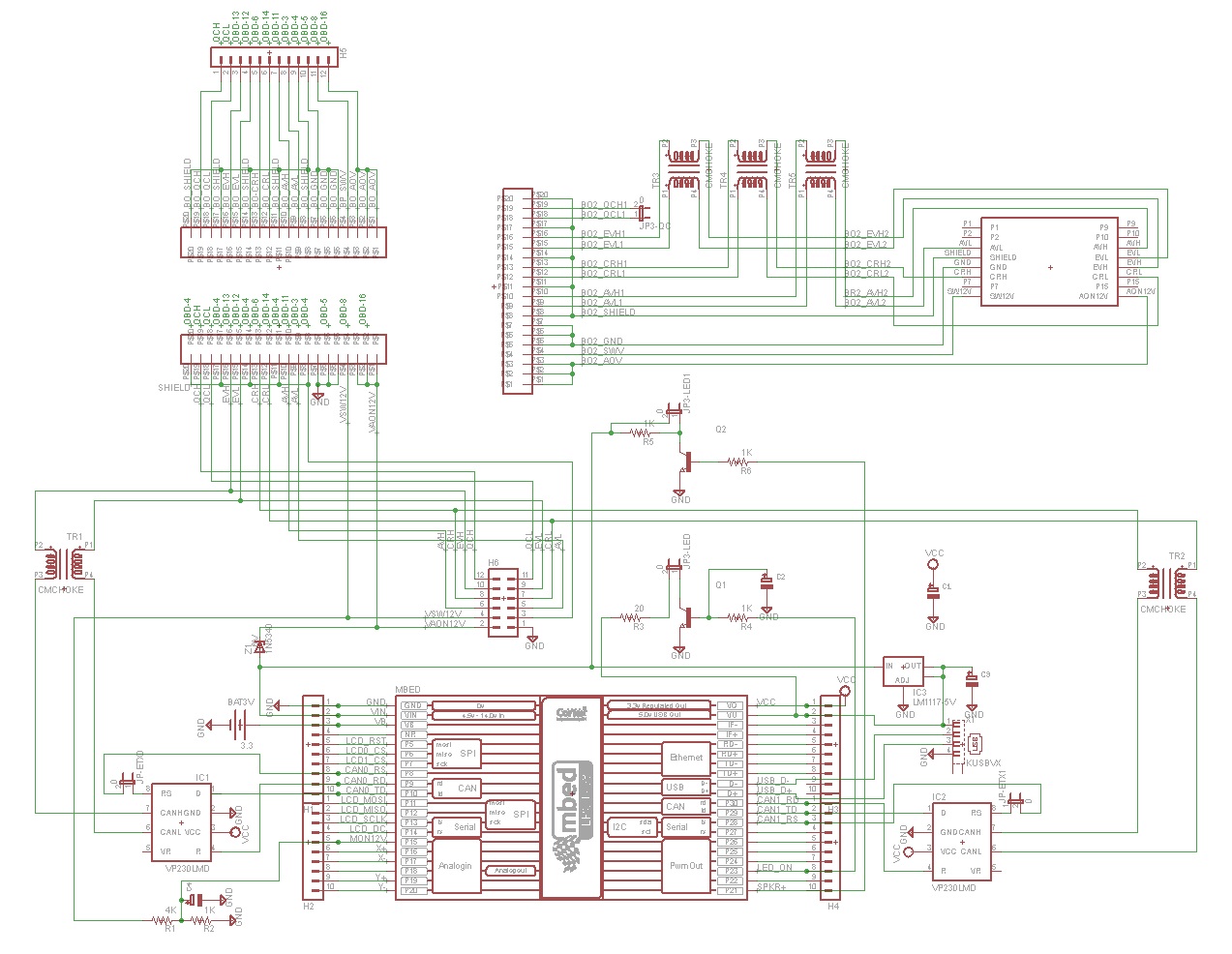
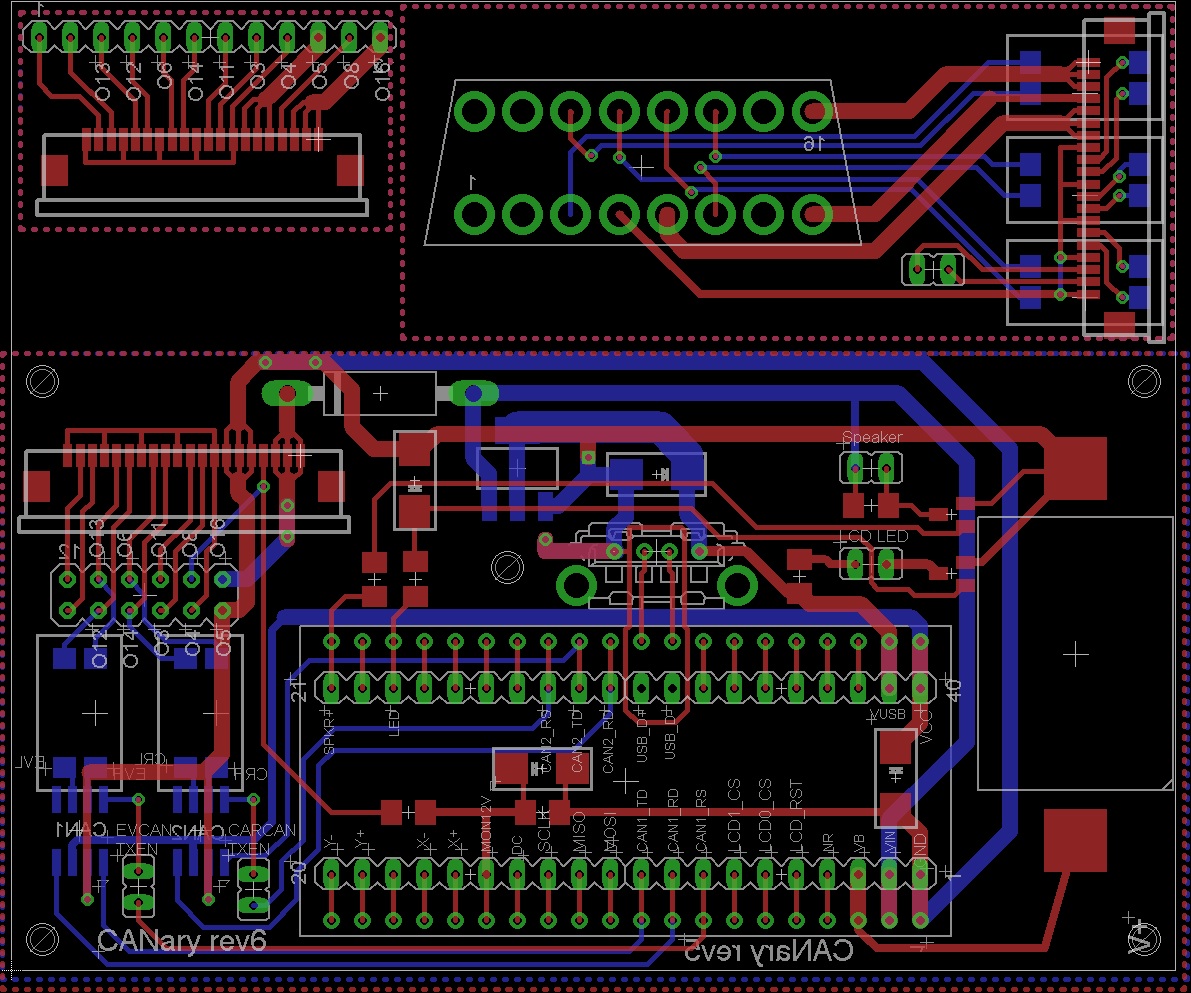
For LCD Rev 1.01:
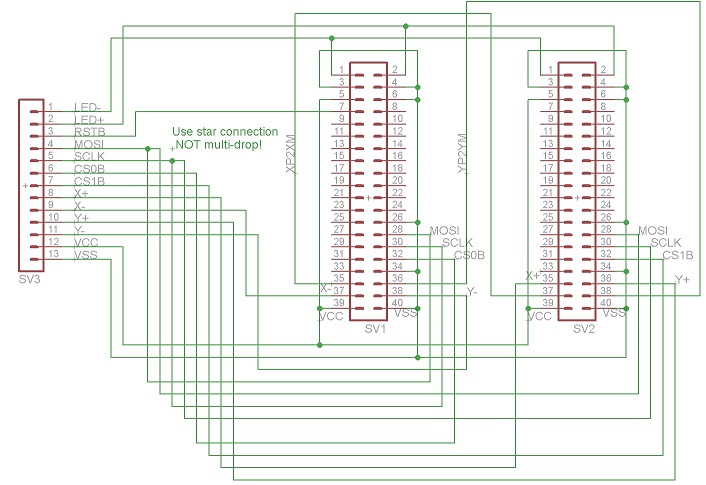
For VCD Rev 2.00:
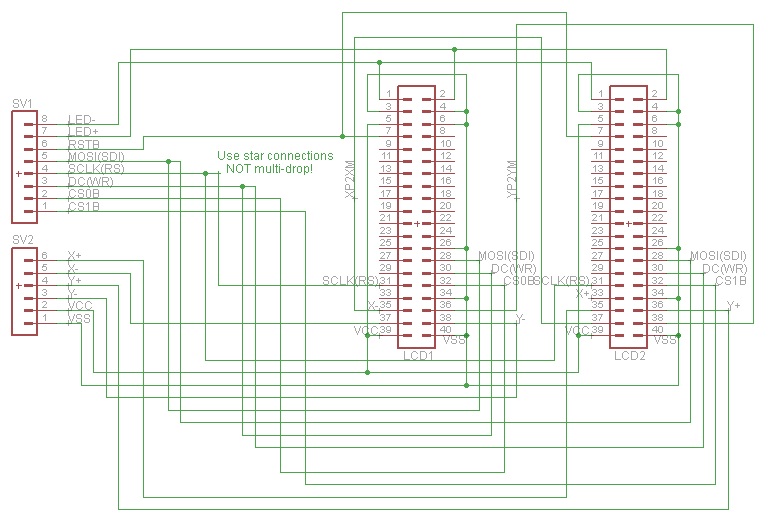
Parts List
Assembly
1) LCD Displays
I found ribbon cable is a nice way to organize the wires to the displays. There are two versions of the display and each must be wired differently. The original project used HW REV. 1.01. For that version, you'll need 12 conductors and I connected them in the following order:
| 1 | LED+ |
| 2 | LED- |
| 3 | RST |
| 4 | SDI |
| 5 | WR/SCLK |
| 6 | CS |
| 7 | X+ |
| 8 | X- |
| 9 | Y+ |
| 10 | Y- |
| 11 | VDD |
| 12 | GND |
If, instead, you have HW REV 2.0, you will need 13 conductors with the following order:
| 1 | LED+ |
| 2 | LED- |
| 3 | RST |
| 4 | SDI |
| 5 | RS (SCLK) |
| 6 | WR (DC) |
| 7 | CS |
| 8 | X+ |
| 9 | X- |
| 10 | Y+ |
| 11 | Y- |
| 12 | VDD |
| 13 | GND |
First I connected all the GND connections (2 GND & IM0, IM1, IM3 for REV1.01 or 2 GND, RD, & IM0 for REV2.00). Do not connect the bottom GND until you have the ribbon cable connected. After making all the ribbon cable connections (connecting the GND of the ribbon cable to the bottom GND pad), solder the GND bar from the previous step to the back of the bottom GND connection. Finally, make a connection from the back side 3.3V pin to IM2 for REV1.01 or to IM1,IM2,&IM3 for REV2.00. Take a break and repeat for the second display.
Examples of REV1.01 boards:
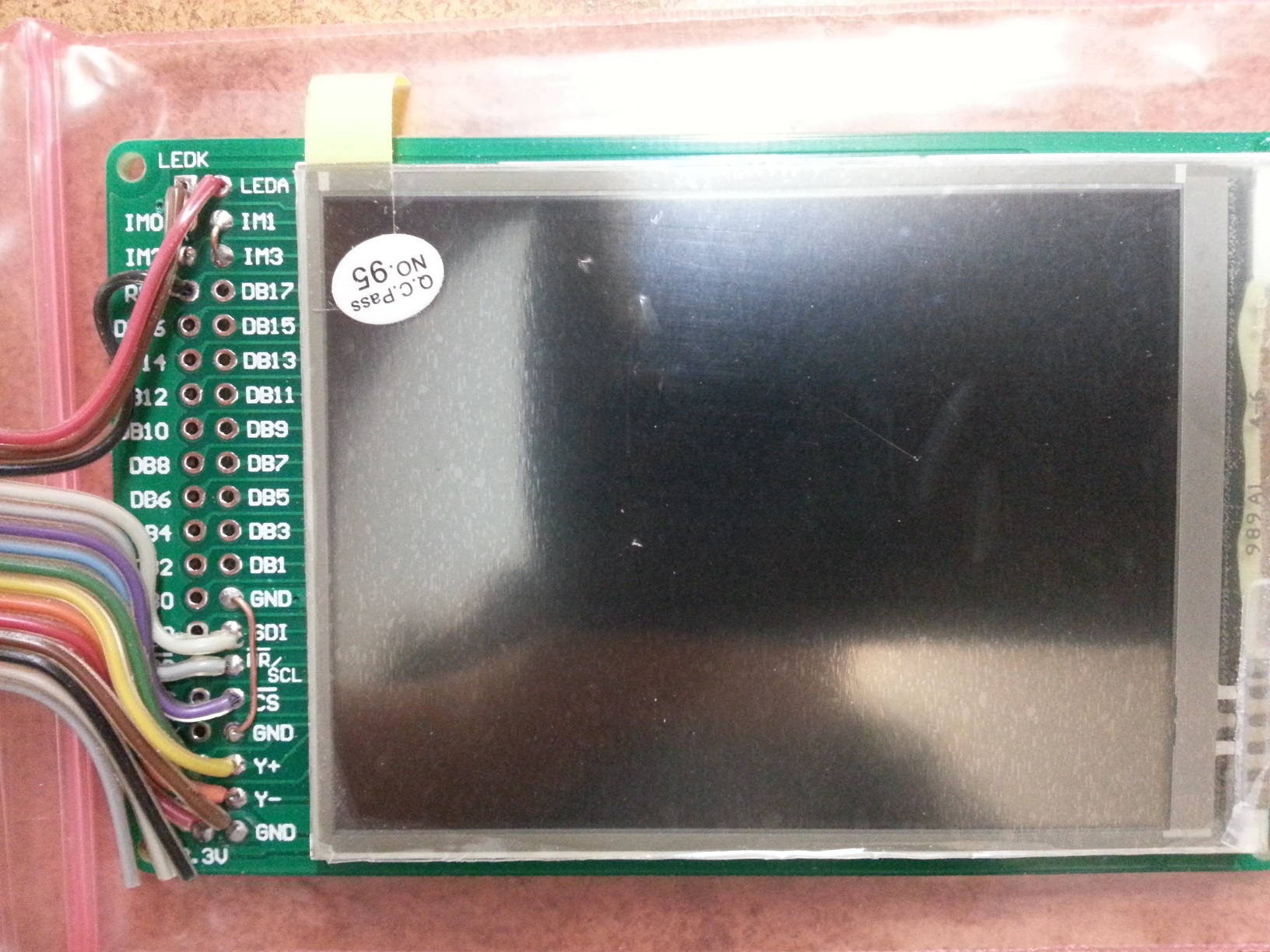
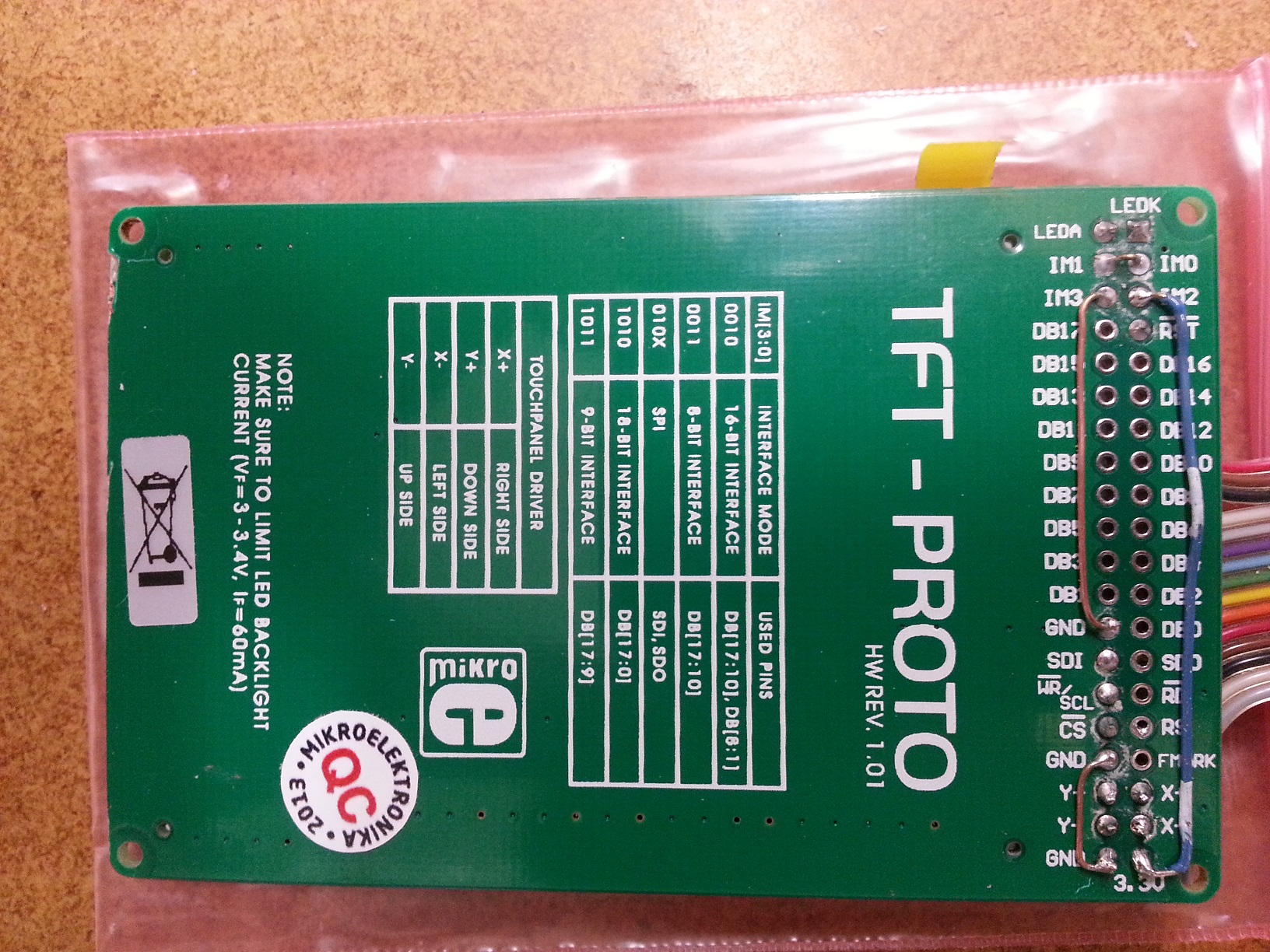
Examples of REV2.00:
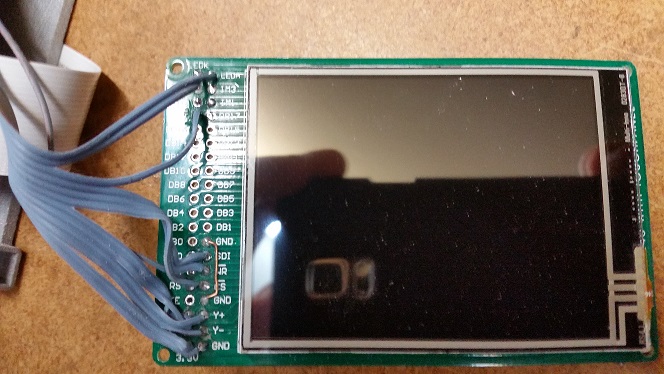
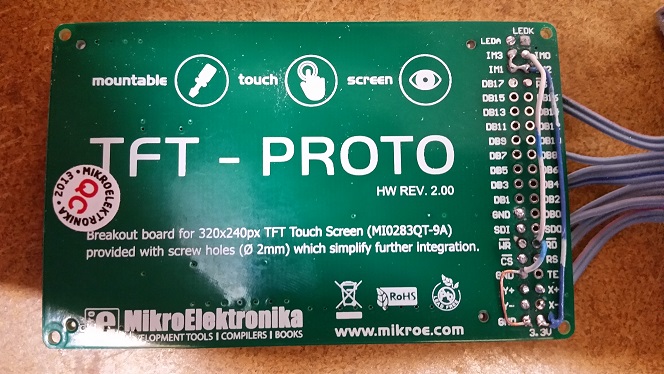
Once the two displays are complete combine all wires except CS0, CS1, X+, X-, Y+, and Y-. Connect X- of the left display to X+ of the right. Similarly connect Y- of the left display to Y+ of the right. Insulate any exposed wires.
2) PCB
Refer to the schematics to place all the components on the board. If you plan to install into the CANary 3D enclosure, DO NOT install the battery holder or the socket for the mbed and, instead, connect two wires to the VB and GND pads nearby. You will have to install the battery holder against the back wall to avoid interfering with the right-hand display and the mbed will have to be directly soldered. I have not found a socket with a low enough profile to fit in the space provided (depth of enclosure is limited by the space behind the center console). Also, I recommend keeping as much lead as possible on the Zener diode (bending it as shown to clear the back wall). Although it is operating well within parameters, the Zener gets quite hot during extended operation and the leads help dissipate the heat and keep it away from the PCB and other components.Update: Several Zeners have failed resulting in damage to some users boards so I recommend using a DC-DC converter instead to bring the 12V down to 7V.
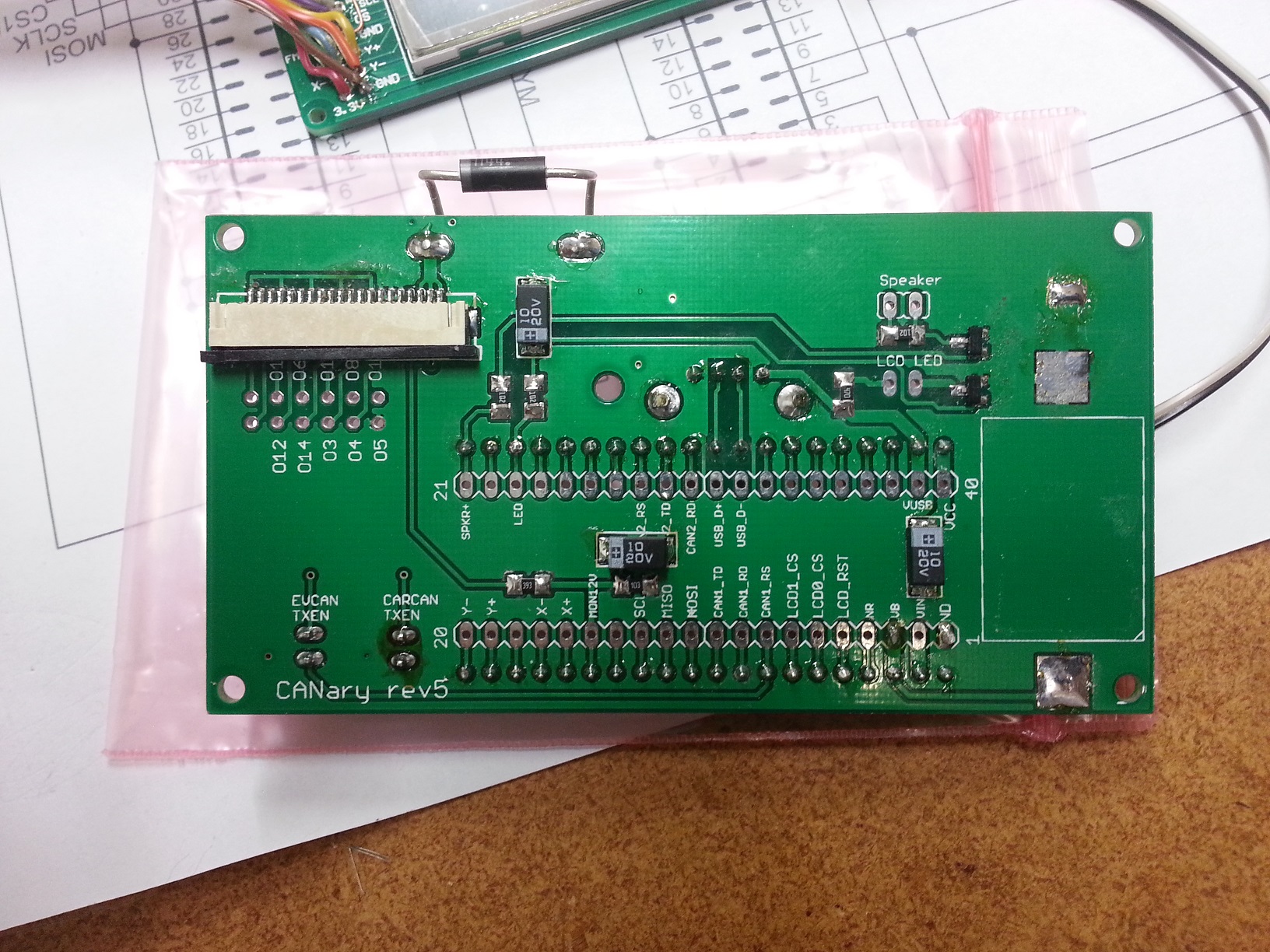
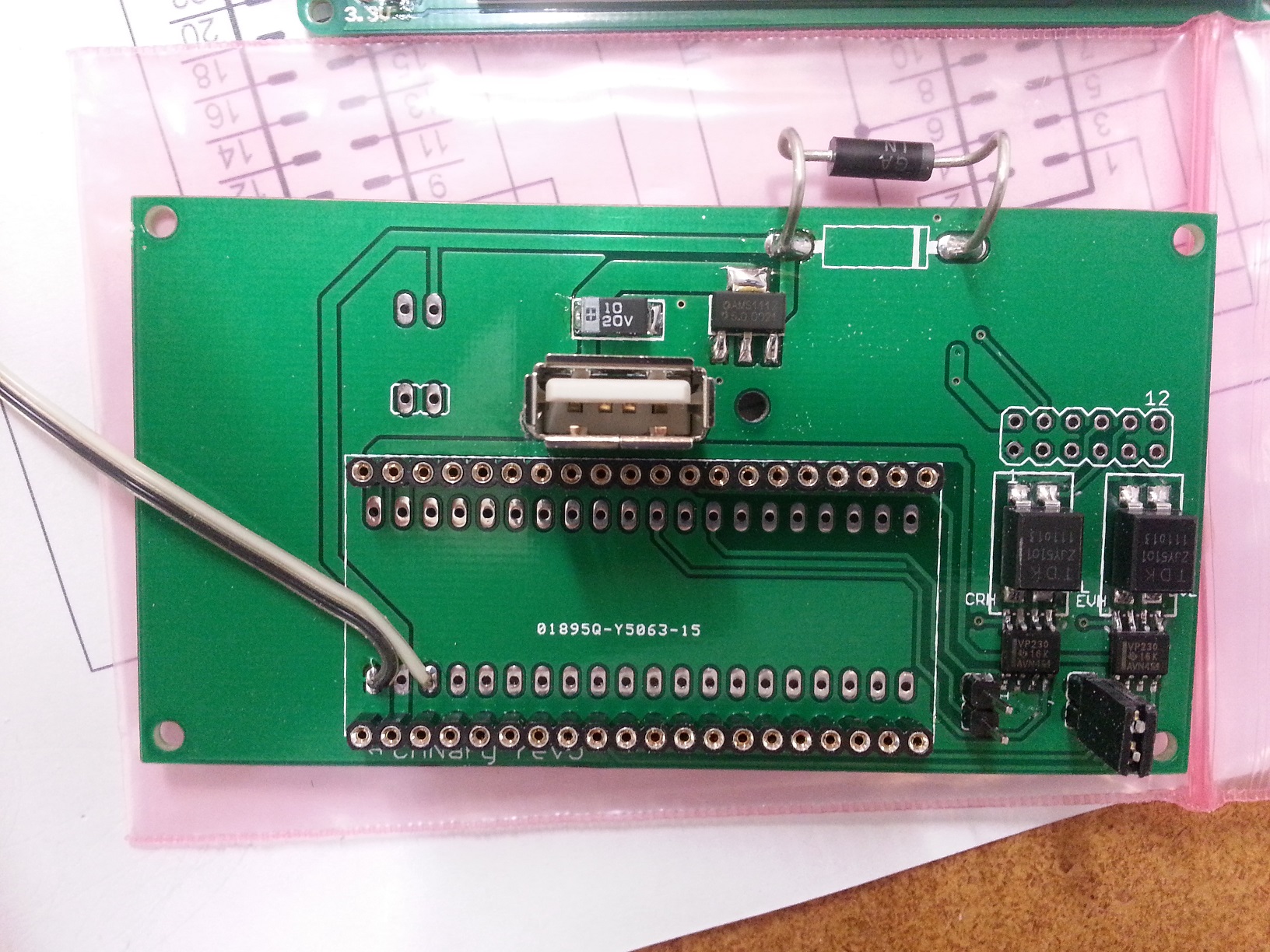
Once the PCB is populated, solder the LCDs to the PCB. CS0 connects to the right display and CS1 connects to the left.
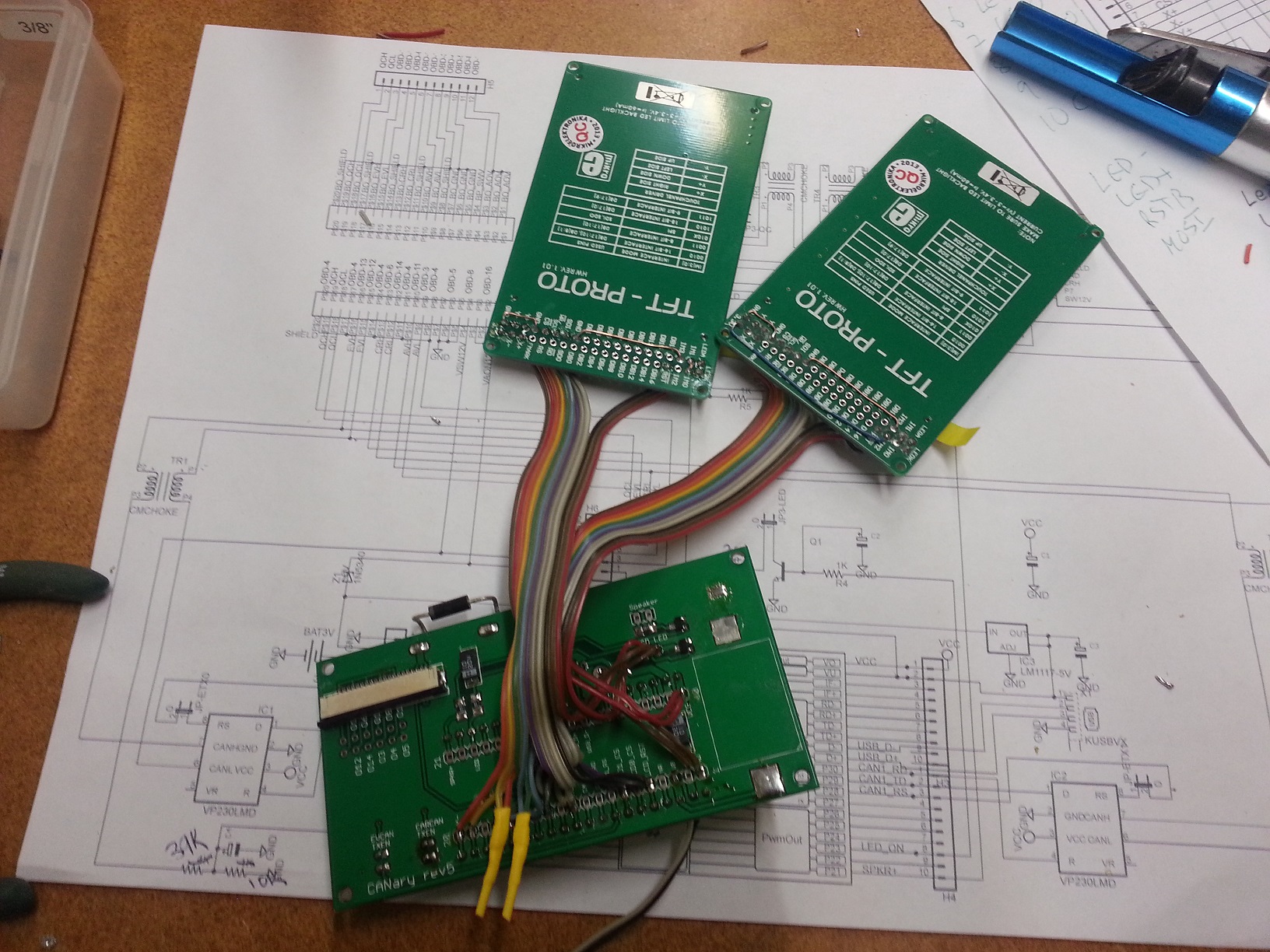
Update:
The Zener diodes tended to fail after a few months so I am recommending removing them and replacing with a DC-DC converter. This will run cooler and waste less energy, too. To install, remove the left display panel to gain access to the Zener. From there, the Zener can be removed and it's pads used to connect to the DC-DC converter. I recommend setting the output voltage on the bench before installing since the trim pot is tricky to reach once installed. Set it to 7V. The input can be connected to the left pad previously occupied by the zener and the output can connect to the right. GND(-) can be connected to the bottom right pad on the 2x6 header below the flex cable connector. Make sure the GND wire lies flat so it doesn't interfere with the connection of the flex cable.
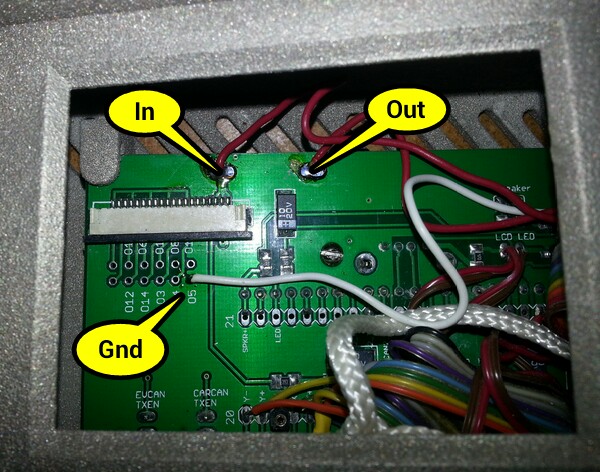
Once soldered in place, the DC-DC converter can easily be mounted to the back wall with double sided tape above the battery holder.
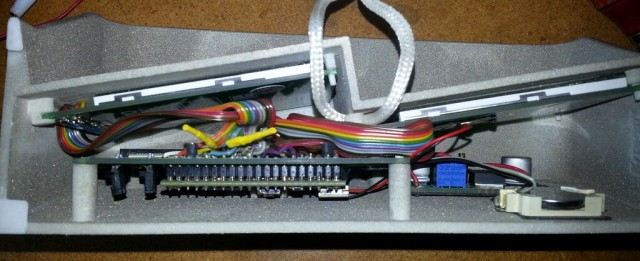
3) Testing
| 1) | First step is to buzz out all connections from the LCDs to the pins in the main board |
| 2) | Next check the touch screen connections. On the main board, place an Ohm meter across X+ and X-. You should read 700 Ohms. Repeat for Y+ and Y-. Then test the resistance from X+ to Y+. With nothing touching the screens, it should read >100K Ohms and <1K when touching either screen. |
| 3) | When all connections are checked, solder in the mbed. Download and install the touch2 program http://mbed.org/users/TickTock/code/touch2/ to test the basic operation of the mbed and touch screens. |
| tips: | |
| Touch screen is sensitive - excess flux on X+,X-,Y+,Y- connection on mbed can result in flakey operation | |
| If touch is not working, double-check the LCD0_CS and LCD1_CS are not swapped. LCD0_CS must connect to the CS of the LCD that has X- & Y- connected to the mbed. LCD1_CS must connect to the CS of the LCD that has X+ & Y+ connected to the mbed. | |
| 4) | Once touch2 works, it is time to connect to the OBD connector. I highly recommend double checking all connections from the OBD to the PCB with the cable in place before connecting to the Leaf. Buzz out all the pins in the OBS to make sure none are shorting to each other, Check that the 12V goes to the Zener (and nothing else) and the switched 12V to the resistor divider (and nothing else). Test the ground connection properly connects to ground and nothing else. |
| 5) | Once you are confident there are no shorts or wrong connections from the OBD connector, take a deep breath and plug it into your leaf. Touch2 program should come up and function. Unplug and install the latest CANary firmware. If you have the REV2.00 LCD boards, you will need to edit the precompile.h file in the TOUCH_TFTx2_w9341 library and set USE_ILI9341 to 1. Test all features before installing into the enclosure (gids, cellpair, menu system, logging) since installing and removing from the enclosure is a PITA. |
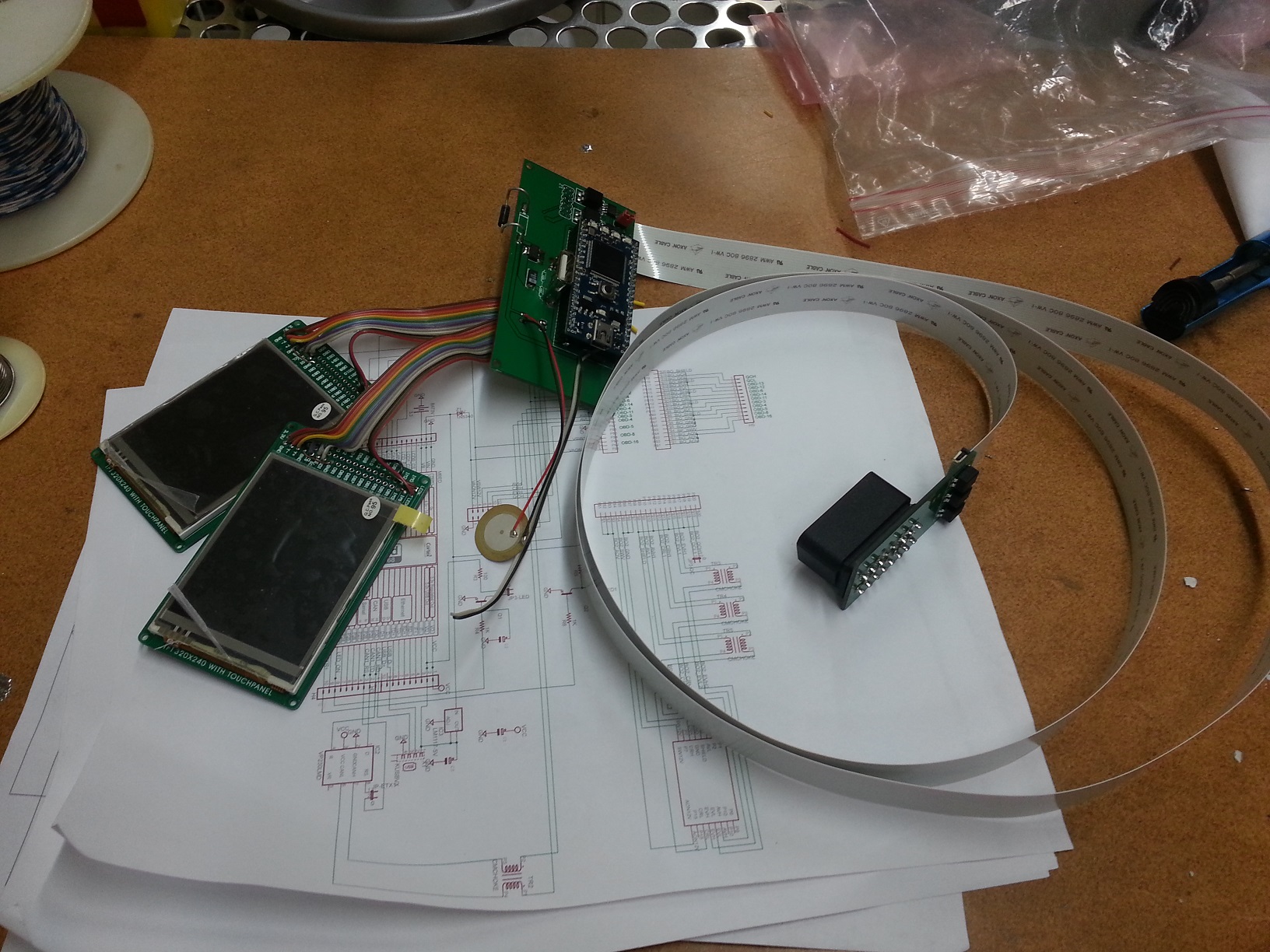
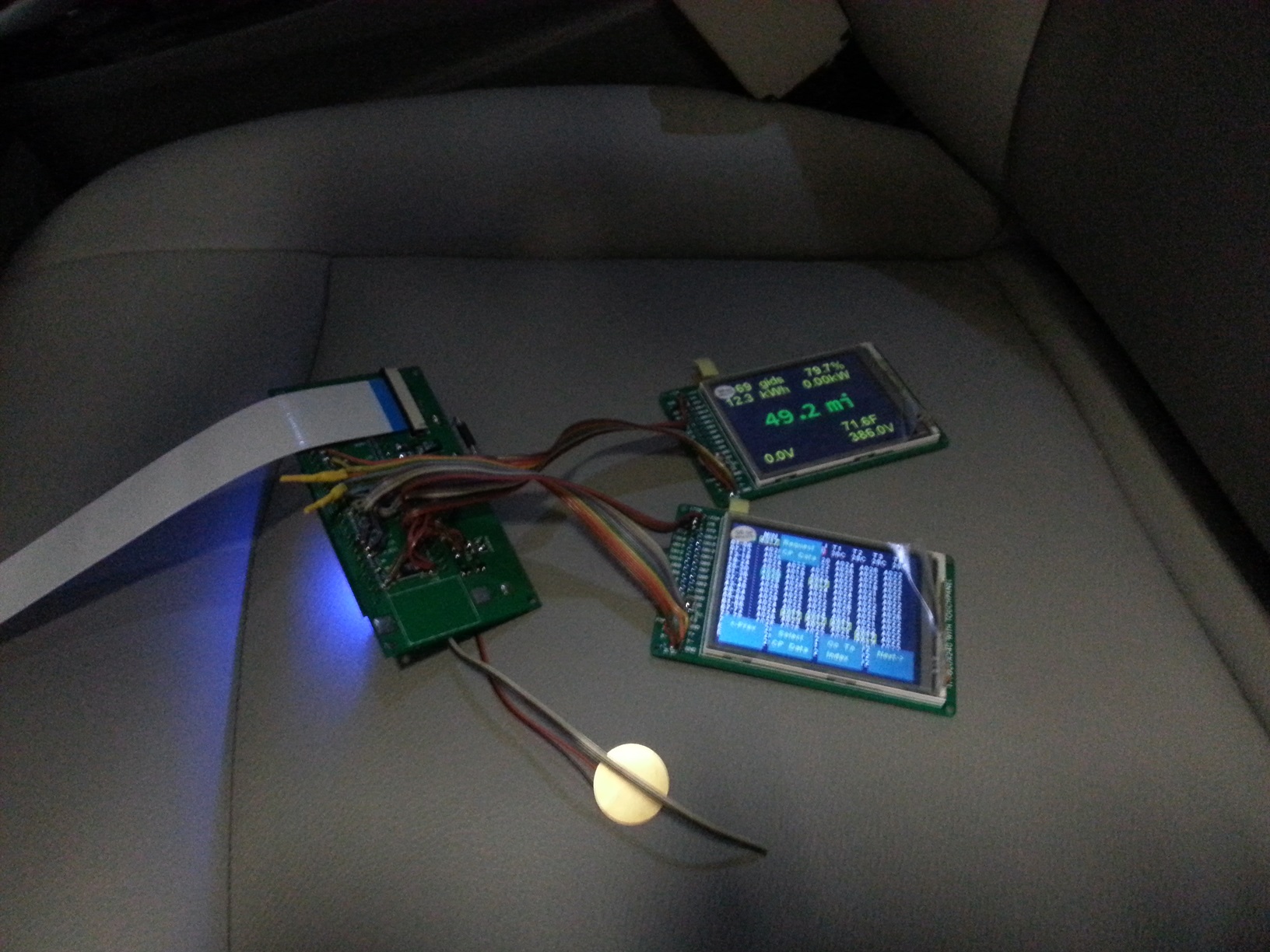
4) Enclosure
The 3D printer leaves a lot of powder behind - I used a strong spray of water to get it out of all the cracks. The enclosure comes with a rather rough finish. I recommend convincing yourself you like it, then simply lightly sand then paint before assembly. Sanding is very difficult - the nylon is very nicely fused and doesn't want to sand. I tried sandblasting and that didn't work either. I had some limited success with filler and then sanding, but only on the outside - it is too difficult to sand the face.
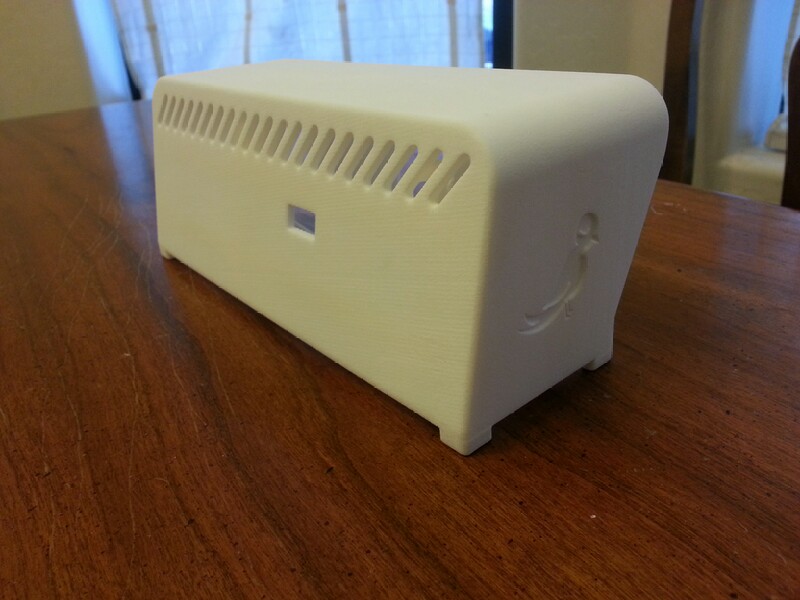
5) Final Assembly
Make sure you are well rested with lots of patience before attempting assembly. It is a puzzle figuring out how to get both displays and the PCB in place. Enclosure was too expensive for me to keep iterating to optimize for assembly. I ended up snipping the thin display posts shorter and using various tools to push the displays into place. Also, some USB connectors are taller than others. If you have one of the taller ones, you will have to deflect the back wall a bit while inserting the PCB (being careful not to bend the housing) to get it to it's opening in the back wall. Do use a screw in the provided post to secure the PCB as USB insertion will otherwise dislodge it.
I added an additional safety line which wraps around the center post to prevent the enclosure from becoming a projectile in the event of an accident.
 Installed:
Installed:
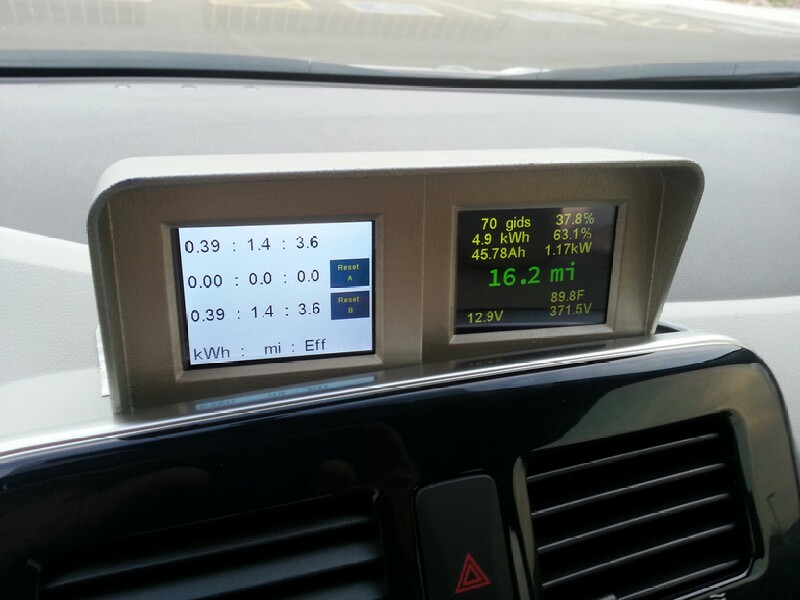
USBHostLite/usbhost_lpc17xx.cpp
- Committer:
- TickTock
- Date:
- 2015-07-01
- Revision:
- 208:bfb6b68d1677
- Parent:
- 146:88f7bda79d8e
File content as of revision 208:bfb6b68d1677:
/*
**************************************************************************************************************
* NXP USB Host Stack
*
* (c) Copyright 2008, NXP SemiConductors
* (c) Copyright 2008, OnChip Technologies LLC
* All Rights Reserved
*
* www.nxp.com
* www.onchiptech.com
*
* File : usbhost_lpc17xx.c
* Programmer(s) : Ravikanth.P
* Version :
*
**************************************************************************************************************
*/
/*
**************************************************************************************************************
* INCLUDE HEADER FILES
**************************************************************************************************************
*/
#include "usbhost_lpc17xx.h"
/*
**************************************************************************************************************
* GLOBAL VARIABLES
**************************************************************************************************************
*/
int gUSBConnected;
volatile USB_INT32U HOST_RhscIntr = 0; /* Root Hub Status Change interrupt */
volatile USB_INT32U HOST_WdhIntr = 0; /* Semaphore to wait until the TD is submitted */
volatile USB_INT08U HOST_TDControlStatus = 0;
volatile HCED *EDCtrl; /* Control endpoint descriptor structure */
volatile HCED *EDBulkIn; /* BulkIn endpoint descriptor structure */
volatile HCED *EDBulkOut; /* BulkOut endpoint descriptor structure */
volatile HCTD *TDHead; /* Head transfer descriptor structure */
volatile HCTD *TDTail; /* Tail transfer descriptor structure */
volatile HCCA *Hcca; /* Host Controller Communications Area structure */
USB_INT16U *TDBufNonVol; /* Identical to TDBuffer just to reduce compiler warnings */
volatile USB_INT08U *TDBuffer; /* Current Buffer Pointer of transfer descriptor */
// USB host structures
// AHB SRAM block 1
#define HOSTBASEADDR 0x2007C000
// reserve memory for the linker
static USB_INT08U HostBuf[0x200] __attribute__((at(HOSTBASEADDR)));
/*
**************************************************************************************************************
* DELAY IN MILLI SECONDS
*
* Description: This function provides a delay in milli seconds
*
* Arguments : delay The delay required
*
* Returns : None
*
**************************************************************************************************************
*/
void Host_DelayMS (USB_INT32U delay)
{
volatile USB_INT32U i;
for (i = 0; i < delay; i++) {
Host_DelayUS(1000);
}
}
/*
**************************************************************************************************************
* DELAY IN MICRO SECONDS
*
* Description: This function provides a delay in micro seconds
*
* Arguments : delay The delay required
*
* Returns : None
*
**************************************************************************************************************
*/
void Host_DelayUS (USB_INT32U delay)
{
volatile USB_INT32U i;
for (i = 0; i < (4 * delay); i++) { /* This logic was tested. It gives app. 1 micro sec delay */
;
}
}
// bits of the USB/OTG clock control register
#define HOST_CLK_EN (1<<0)
#define DEV_CLK_EN (1<<1)
#define PORTSEL_CLK_EN (1<<3)
#define AHB_CLK_EN (1<<4)
// bits of the USB/OTG clock status register
#define HOST_CLK_ON (1<<0)
#define DEV_CLK_ON (1<<1)
#define PORTSEL_CLK_ON (1<<3)
#define AHB_CLK_ON (1<<4)
// we need host clock, OTG/portsel clock and AHB clock
#define CLOCK_MASK (HOST_CLK_EN | PORTSEL_CLK_EN | AHB_CLK_EN)
/*
**************************************************************************************************************
* INITIALIZE THE HOST CONTROLLER
*
* Description: This function initializes lpc17xx host controller
*
* Arguments : None
*
* Returns :
*
**************************************************************************************************************
*/
void Host_Init (void)
{
PRINT_Log("In Host_Init\n");
NVIC_DisableIRQ(USB_IRQn); /* Disable the USB interrupt source */
// turn on power for USB
LPC_SC->PCONP |= (1UL<<31);
// Enable USB host clock, port selection and AHB clock
LPC_USB->USBClkCtrl |= CLOCK_MASK;
// Wait for clocks to become available
while ((LPC_USB->USBClkSt & CLOCK_MASK) != CLOCK_MASK)
;
// it seems the bits[0:1] mean the following
// 0: U1=device, U2=host
// 1: U1=host, U2=host
// 2: reserved
// 3: U1=host, U2=device
// NB: this register is only available if OTG clock (aka "port select") is enabled!!
// since we don't care about port 2, set just bit 0 to 1 (U1=host)
LPC_USB->OTGStCtrl |= 1;
// now that we've configured the ports, we can turn off the portsel clock
LPC_USB->USBClkCtrl &= ~PORTSEL_CLK_EN;
// power pins are not connected on mbed, so we can skip them
/* P1[18] = USB_UP_LED, 01 */
/* P1[19] = /USB_PPWR, 10 */
/* P1[22] = USB_PWRD, 10 */
/* P1[27] = /USB_OVRCR, 10 */
/*LPC_PINCON->PINSEL3 &= ~((3<<4) | (3<<6) | (3<<12) | (3<<22));
LPC_PINCON->PINSEL3 |= ((1<<4)|(2<<6) | (2<<12) | (2<<22)); // 0x00802080
*/
// configure USB D+/D- pins
/* P0[29] = USB_D+, 01 */
/* P0[30] = USB_D-, 01 */
LPC_PINCON->PINSEL1 &= ~((3<<26) | (3<<28));
LPC_PINCON->PINSEL1 |= ((1<<26)|(1<<28)); // 0x14000000
PRINT_Log("Initializing Host Stack\n");
Hcca = (volatile HCCA *)(HostBuf+0x000);
TDHead = (volatile HCTD *)(HostBuf+0x100);
TDTail = (volatile HCTD *)(HostBuf+0x110);
EDCtrl = (volatile HCED *)(HostBuf+0x120);
EDBulkIn = (volatile HCED *)(HostBuf+0x130);
EDBulkOut = (volatile HCED *)(HostBuf+0x140);
TDBuffer = (volatile USB_INT08U *)(HostBuf+0x150);
/* Initialize all the TDs, EDs and HCCA to 0 */
Host_EDInit(EDCtrl);
Host_EDInit(EDBulkIn);
Host_EDInit(EDBulkOut);
Host_TDInit(TDHead);
Host_TDInit(TDTail);
Host_HCCAInit(Hcca);
Host_DelayMS(50); /* Wait 50 ms before apply reset */
LPC_USB->HcControl = 0; /* HARDWARE RESET */
LPC_USB->HcControlHeadED = 0; /* Initialize Control list head to Zero */
LPC_USB->HcBulkHeadED = 0; /* Initialize Bulk list head to Zero */
/* SOFTWARE RESET */
LPC_USB->HcCommandStatus = OR_CMD_STATUS_HCR;
LPC_USB->HcFmInterval = DEFAULT_FMINTERVAL; /* Write Fm Interval and Largest Data Packet Counter */
/* Put HC in operational state */
LPC_USB->HcControl = (LPC_USB->HcControl & (~OR_CONTROL_HCFS)) | OR_CONTROL_HC_OPER;
LPC_USB->HcRhStatus = OR_RH_STATUS_LPSC; /* Set Global Power */
LPC_USB->HcHCCA = (USB_INT32U)Hcca;
LPC_USB->HcInterruptStatus |= LPC_USB->HcInterruptStatus; /* Clear Interrrupt Status */
LPC_USB->HcInterruptEnable = OR_INTR_ENABLE_MIE |
OR_INTR_ENABLE_WDH |
OR_INTR_ENABLE_RHSC;
NVIC_SetPriority(USB_IRQn, 0); /* highest priority */
/* Enable the USB Interrupt */
NVIC_EnableIRQ(USB_IRQn);
PRINT_Log("Host Initialized\n");
}
/*
**************************************************************************************************************
* INTERRUPT SERVICE ROUTINE
*
* Description: This function services the interrupt caused by host controller
*
* Arguments : None
*
* Returns : None
*
**************************************************************************************************************
*/
void USB_IRQHandler (void) __irq
{
USB_INT32U int_status;
USB_INT32U ie_status;
int_status = LPC_USB->HcInterruptStatus; /* Read Interrupt Status */
ie_status = LPC_USB->HcInterruptEnable; /* Read Interrupt enable status */
if (!(int_status & ie_status)) {
return;
} else {
int_status = int_status & ie_status;
if (int_status & OR_INTR_STATUS_RHSC) { /* Root hub status change interrupt */
if (LPC_USB->HcRhPortStatus1 & OR_RH_PORT_CSC) {
if (LPC_USB->HcRhStatus & OR_RH_STATUS_DRWE) {
/*
* When DRWE is on, Connect Status Change
* means a remote wakeup event.
*/
HOST_RhscIntr = 1;// JUST SOMETHING FOR A BREAKPOINT
}
else {
/*
* When DRWE is off, Connect Status Change
* is NOT a remote wakeup event
*/
if (LPC_USB->HcRhPortStatus1 & OR_RH_PORT_CCS) {
if (!gUSBConnected) {
HOST_TDControlStatus = 0;
HOST_WdhIntr = 0;
HOST_RhscIntr = 1;
gUSBConnected = 1;
}
else
PRINT_Log("Spurious status change (connected)?\n");
} else {
if (gUSBConnected) {
LPC_USB->HcInterruptEnable = 0; // why do we get multiple disc. rupts???
HOST_RhscIntr = 0;
gUSBConnected = 0;
}
else
PRINT_Log("Spurious status change (disconnected)?\n");
}
}
LPC_USB->HcRhPortStatus1 = OR_RH_PORT_CSC;
}
if (LPC_USB->HcRhPortStatus1 & OR_RH_PORT_PRSC) {
LPC_USB->HcRhPortStatus1 = OR_RH_PORT_PRSC;
}
}
if (int_status & OR_INTR_STATUS_WDH) { /* Writeback Done Head interrupt */
HOST_WdhIntr = 1;
HOST_TDControlStatus = (TDHead->Control >> 28) & 0xf;
}
LPC_USB->HcInterruptStatus = int_status; /* Clear interrupt status register */
}
return;
}
/*
**************************************************************************************************************
* PROCESS TRANSFER DESCRIPTOR
*
* Description: This function processes the transfer descriptor
*
* Arguments : ed Endpoint descriptor that contains this transfer descriptor
* token SETUP, IN, OUT
* buffer Current Buffer Pointer of the transfer descriptor
* buffer_len Length of the buffer
*
* Returns : OK if TD submission is successful
* ERROR if TD submission fails
*
**************************************************************************************************************
*/
USB_INT32S Host_ProcessTD (volatile HCED *ed,
volatile USB_INT32U token,
volatile USB_INT08U *buffer,
USB_INT32U buffer_len)
{
volatile USB_INT32U td_toggle;
if (ed == EDCtrl) {
if (token == TD_SETUP) {
td_toggle = TD_TOGGLE_0;
} else {
td_toggle = TD_TOGGLE_1;
}
} else {
td_toggle = 0;
}
TDHead->Control = (TD_ROUNDING |
token |
TD_DELAY_INT(0) |
td_toggle |
TD_CC);
TDTail->Control = 0;
TDHead->CurrBufPtr = (USB_INT32U) buffer;
TDTail->CurrBufPtr = 0;
TDHead->Next = (USB_INT32U) TDTail;
TDTail->Next = 0;
TDHead->BufEnd = (USB_INT32U)(buffer + (buffer_len - 1));
TDTail->BufEnd = 0;
ed->HeadTd = (USB_INT32U)TDHead | ((ed->HeadTd) & 0x00000002);
ed->TailTd = (USB_INT32U)TDTail;
ed->Next = 0;
if (ed == EDCtrl) {
LPC_USB->HcControlHeadED = (USB_INT32U)ed;
LPC_USB->HcCommandStatus = LPC_USB->HcCommandStatus | OR_CMD_STATUS_CLF;
LPC_USB->HcControl = LPC_USB->HcControl | OR_CONTROL_CLE;
} else {
LPC_USB->HcBulkHeadED = (USB_INT32U)ed;
LPC_USB->HcCommandStatus = LPC_USB->HcCommandStatus | OR_CMD_STATUS_BLF;
LPC_USB->HcControl = LPC_USB->HcControl | OR_CONTROL_BLE;
}
Host_WDHWait();
// if (!(TDHead->Control & 0xF0000000)) {
if (!HOST_TDControlStatus) {
return (OK);
} else {
return (ERR_TD_FAIL);
}
}
/*
**************************************************************************************************************
* ENUMERATE THE DEVICE
*
* Description: This function is used to enumerate the device connected
*
* Arguments : None
*
* Returns : None
*
**************************************************************************************************************
*/
USB_INT32S Host_EnumDev (void)
{
USB_INT32S rc;
PRINT_Log("Connect a Mass Storage device\n");
while (!HOST_RhscIntr)
__WFI();
Host_DelayMS(100); /* USB 2.0 spec says atleast 50ms delay beore port reset */
LPC_USB->HcRhPortStatus1 = OR_RH_PORT_PRS; // Initiate port reset
while (LPC_USB->HcRhPortStatus1 & OR_RH_PORT_PRS)
__WFI(); // Wait for port reset to complete...
LPC_USB->HcRhPortStatus1 = OR_RH_PORT_PRSC; // ...and clear port reset signal
Host_DelayMS(200); /* Wait for 100 MS after port reset */
EDCtrl->Control = 8 << 16; /* Put max pkt size = 8 */
/* Read first 8 bytes of device desc */
rc = HOST_GET_DESCRIPTOR(USB_DESCRIPTOR_TYPE_DEVICE, 0, TDBuffer, 8);
if (rc != OK) {
PRINT_Err(rc);
return (rc);
}
EDCtrl->Control = TDBuffer[7] << 16; /* Get max pkt size of endpoint 0 */
rc = HOST_SET_ADDRESS(1); /* Set the device address to 1 */
if (rc != OK) {
PRINT_Err(rc);
return (rc);
}
Host_DelayMS(2);
EDCtrl->Control = (EDCtrl->Control) | 1; /* Modify control pipe with address 1 */
/* Get the configuration descriptor */
rc = HOST_GET_DESCRIPTOR(USB_DESCRIPTOR_TYPE_CONFIGURATION, 0, TDBuffer, 9);
if (rc != OK) {
PRINT_Err(rc);
return (rc);
}
/* Get the first configuration data */
rc = HOST_GET_DESCRIPTOR(USB_DESCRIPTOR_TYPE_CONFIGURATION, 0, TDBuffer, ReadLE16U(&TDBuffer[2]));
if (rc != OK) {
PRINT_Err(rc);
return (rc);
}
rc = MS_ParseConfiguration(); /* Parse the configuration */
if (rc != OK) {
PRINT_Err(rc);
return (rc);
}
rc = USBH_SET_CONFIGURATION(1); /* Select device configuration 1 */
if (rc != OK) {
PRINT_Err(rc);
}
Host_DelayMS(100); /* Some devices may require this delay */
return (rc);
}
/*
**************************************************************************************************************
* RECEIVE THE CONTROL INFORMATION
*
* Description: This function is used to receive the control information
*
* Arguments : bm_request_type
* b_request
* w_value
* w_index
* w_length
* buffer
*
* Returns : OK if Success
* ERROR if Failed
*
**************************************************************************************************************
*/
USB_INT32S Host_CtrlRecv ( USB_INT08U bm_request_type,
USB_INT08U b_request,
USB_INT16U w_value,
USB_INT16U w_index,
USB_INT16U w_length,
volatile USB_INT08U *buffer)
{
USB_INT32S rc;
Host_FillSetup(bm_request_type, b_request, w_value, w_index, w_length);
rc = Host_ProcessTD(EDCtrl, TD_SETUP, TDBuffer, 8);
if (rc == OK) {
if (w_length) {
rc = Host_ProcessTD(EDCtrl, TD_IN, TDBuffer, w_length);
}
if (rc == OK) {
rc = Host_ProcessTD(EDCtrl, TD_OUT, NULL, 0);
}
}
return (rc);
}
/*
**************************************************************************************************************
* SEND THE CONTROL INFORMATION
*
* Description: This function is used to send the control information
*
* Arguments : None
*
* Returns : OK if Success
* ERR_INVALID_BOOTSIG if Failed
*
**************************************************************************************************************
*/
USB_INT32S Host_CtrlSend ( USB_INT08U bm_request_type,
USB_INT08U b_request,
USB_INT16U w_value,
USB_INT16U w_index,
USB_INT16U w_length,
volatile USB_INT08U *buffer)
{
USB_INT32S rc;
Host_FillSetup(bm_request_type, b_request, w_value, w_index, w_length);
rc = Host_ProcessTD(EDCtrl, TD_SETUP, TDBuffer, 8);
if (rc == OK) {
if (w_length) {
rc = Host_ProcessTD(EDCtrl, TD_OUT, TDBuffer, w_length);
}
if (rc == OK) {
rc = Host_ProcessTD(EDCtrl, TD_IN, NULL, 0);
}
}
return (rc);
}
/*
**************************************************************************************************************
* FILL SETUP PACKET
*
* Description: This function is used to fill the setup packet
*
* Arguments : None
*
* Returns : OK if Success
* ERR_INVALID_BOOTSIG if Failed
*
**************************************************************************************************************
*/
void Host_FillSetup (USB_INT08U bm_request_type,
USB_INT08U b_request,
USB_INT16U w_value,
USB_INT16U w_index,
USB_INT16U w_length)
{
int i;
for (i=0;i<w_length;i++)
TDBuffer[i] = 0;
TDBuffer[0] = bm_request_type;
TDBuffer[1] = b_request;
WriteLE16U(&TDBuffer[2], w_value);
WriteLE16U(&TDBuffer[4], w_index);
WriteLE16U(&TDBuffer[6], w_length);
}
/*
**************************************************************************************************************
* INITIALIZE THE TRANSFER DESCRIPTOR
*
* Description: This function initializes transfer descriptor
*
* Arguments : Pointer to TD structure
*
* Returns : None
*
**************************************************************************************************************
*/
void Host_TDInit (volatile HCTD *td)
{
td->Control = 0;
td->CurrBufPtr = 0;
td->Next = 0;
td->BufEnd = 0;
}
/*
**************************************************************************************************************
* INITIALIZE THE ENDPOINT DESCRIPTOR
*
* Description: This function initializes endpoint descriptor
*
* Arguments : Pointer to ED strcuture
*
* Returns : None
*
**************************************************************************************************************
*/
void Host_EDInit (volatile HCED *ed)
{
ed->Control = 0;
ed->TailTd = 0;
ed->HeadTd = 0;
ed->Next = 0;
}
/*
**************************************************************************************************************
* INITIALIZE HOST CONTROLLER COMMUNICATIONS AREA
*
* Description: This function initializes host controller communications area
*
* Arguments : Pointer to HCCA
*
* Returns :
*
**************************************************************************************************************
*/
void Host_HCCAInit (volatile HCCA *hcca)
{
USB_INT32U i;
for (i = 0; i < 32; i++) {
hcca->IntTable[i] = 0;
hcca->FrameNumber = 0;
hcca->DoneHead = 0;
}
}
/*
**************************************************************************************************************
* WAIT FOR WDH INTERRUPT
*
* Description: This function is infinite loop which breaks when ever a WDH interrupt rises
*
* Arguments : None
*
* Returns : None
*
**************************************************************************************************************
*/
void Host_WDHWait (void)
{
while (!HOST_WdhIntr)
__WFI();
HOST_WdhIntr = 0;
}
/*
**************************************************************************************************************
* READ LE 32U
*
* Description: This function is used to read an unsigned integer from a character buffer in the platform
* containing little endian processor
*
* Arguments : pmem Pointer to the character buffer
*
* Returns : val Unsigned integer
*
**************************************************************************************************************
*/
USB_INT32U ReadLE32U (volatile USB_INT08U *pmem)
{
USB_INT32U val = *(USB_INT32U*)pmem;
#ifdef __BIG_ENDIAN
return __REV(val);
#else
return val;
#endif
}
/*
**************************************************************************************************************
* WRITE LE 32U
*
* Description: This function is used to write an unsigned integer into a charecter buffer in the platform
* containing little endian processor.
*
* Arguments : pmem Pointer to the charecter buffer
* val Integer value to be placed in the charecter buffer
*
* Returns : None
*
**************************************************************************************************************
*/
void WriteLE32U (volatile USB_INT08U *pmem,
USB_INT32U val)
{
#ifdef __BIG_ENDIAN
*(USB_INT32U*)pmem = __REV(val);
#else
*(USB_INT32U*)pmem = val;
#endif
}
/*
**************************************************************************************************************
* READ LE 16U
*
* Description: This function is used to read an unsigned short integer from a charecter buffer in the platform
* containing little endian processor
*
* Arguments : pmem Pointer to the charecter buffer
*
* Returns : val Unsigned short integer
*
**************************************************************************************************************
*/
USB_INT16U ReadLE16U (volatile USB_INT08U *pmem)
{
USB_INT16U val = *(USB_INT16U*)pmem;
#ifdef __BIG_ENDIAN
return __REV16(val);
#else
return val;
#endif
}
/*
**************************************************************************************************************
* WRITE LE 16U
*
* Description: This function is used to write an unsigned short integer into a charecter buffer in the
* platform containing little endian processor
*
* Arguments : pmem Pointer to the charecter buffer
* val Value to be placed in the charecter buffer
*
* Returns : None
*
**************************************************************************************************************
*/
void WriteLE16U (volatile USB_INT08U *pmem,
USB_INT16U val)
{
#ifdef __BIG_ENDIAN
*(USB_INT16U*)pmem = (__REV16(val) & 0xFFFF);
#else
*(USB_INT16U*)pmem = val;
#endif
}
/*
**************************************************************************************************************
* READ BE 32U
*
* Description: This function is used to read an unsigned integer from a charecter buffer in the platform
* containing big endian processor
*
* Arguments : pmem Pointer to the charecter buffer
*
* Returns : val Unsigned integer
*
**************************************************************************************************************
*/
USB_INT32U ReadBE32U (volatile USB_INT08U *pmem)
{
USB_INT32U val = *(USB_INT32U*)pmem;
#ifdef __BIG_ENDIAN
return val;
#else
return __REV(val);
#endif
}
/*
**************************************************************************************************************
* WRITE BE 32U
*
* Description: This function is used to write an unsigned integer into a charecter buffer in the platform
* containing big endian processor
*
* Arguments : pmem Pointer to the charecter buffer
* val Value to be placed in the charecter buffer
*
* Returns : None
*
**************************************************************************************************************
*/
void WriteBE32U (volatile USB_INT08U *pmem,
USB_INT32U val)
{
#ifdef __BIG_ENDIAN
*(USB_INT32U*)pmem = val;
#else
*(USB_INT32U*)pmem = __REV(val);
#endif
}
/*
**************************************************************************************************************
* READ BE 16U
*
* Description: This function is used to read an unsigned short integer from a charecter buffer in the platform
* containing big endian processor
*
* Arguments : pmem Pointer to the charecter buffer
*
* Returns : val Unsigned short integer
*
**************************************************************************************************************
*/
USB_INT16U ReadBE16U (volatile USB_INT08U *pmem)
{
USB_INT16U val = *(USB_INT16U*)pmem;
#ifdef __BIG_ENDIAN
return val;
#else
return __REV16(val);
#endif
}
/*
**************************************************************************************************************
* WRITE BE 16U
*
* Description: This function is used to write an unsigned short integer into the charecter buffer in the
* platform containing big endian processor
*
* Arguments : pmem Pointer to the charecter buffer
* val Value to be placed in the charecter buffer
*
* Returns : None
*
**************************************************************************************************************
*/
void WriteBE16U (volatile USB_INT08U *pmem,
USB_INT16U val)
{
#ifdef __BIG_ENDIAN
*(USB_INT16U*)pmem = val;
#else
*(USB_INT16U*)pmem = (__REV16(val) & 0xFFFF);
#endif
}
